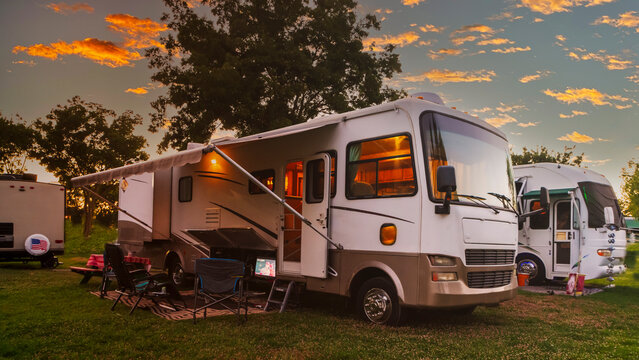7 Mistakes People Make When Living in an RV Full-Time (And How to Avoid Them)

Thinking about living in an RV full-time? It’s exciting. There’s freedom, flexibility, and the chance to wake up in a new place whenever you want. But before you hit the road, there’s something worth knowing: it’s easy to get caught out if you’re not prepared.
Plenty of people jump in with the best intentions, but without really understanding what day-to-day RV life actually looks like. A bit of planning (and knowing what to avoid) can make all the difference between thriving on the road or running into frustrating roadblocks.
Let’s break down the common mistakes people make when transitioning to full-time RV living and how you can steer clear of them.
1. Assuming It’s Always Cheap
Yes, RV life can be more affordable than living in a house. But it’s not automatically a budget-friendly lifestyle. The truth is, costs can creep up quickly if you’re not paying attention.
Here’s what catches people off guard:
- Campground fees that add up fast, especially in peak seasons
- Fuel costs if you’re moving often
- Maintenance and repairs, which can be both frequent and pricey
- Unexpected costs like tolls, laundry, and mobile data plans
It’s smart to create a realistic monthly budget before you hit the road. Track your spending for the first few months so you can adjust and avoid financial stress.
2. Bringing Way Too Much Stuff
This one’s a classic. People pack like they’re moving into a house, not a rolling home with limited space. Overpacking leads to clutter, extra weight, and a cramped living environment that doesn’t feel relaxing at all.
You’ll need far less than you think. Once you’ve been living in the RV for a while, you’ll notice there are certain clothes, kitchen tools, and gadgets you barely touch.
Focus on quality over quantity. Choose multipurpose items. And yes, you can live with just a few pairs of shoes.
3. Ignoring Routine Maintenance
Out of sight, out of mind doesn’t work with RVs. If you ignore regular checks and maintenance, small problems can turn into expensive repairs.
Things that need regular attention include:
- Tyre pressure
- Roof seals
- Water systems
- Battery levels
- Slide-outs and awnings
Get into a routine. Make a checklist and stick to it. You don’t have to be an expert mechanic, but you do need to stay on top of the basics.
4. Not Building Flexibility Into Your Plans
Some people start RV life thinking they need a rigid itinerary. Every stop mapped out. Every date locked in. But that kind of structure can actually get in the way of enjoying the freedom RV life offers.
A better approach? Boldly planning your RV lifestyle with enough flexibility to adapt as you go. Things won’t always go according to plan, and that’s part of the fun. You might want to stay longer in one place, or avoid bad weather, or take a detour on a whim. When your plans leave space for spontaneity, the whole journey becomes a lot less stressful and a lot more rewarding.
5. Choosing the Wrong RV for Your Lifestyle
Not every RV suits full-time living. Some are better for weekend trips or short holidays. If you pick the wrong size or layout, you could end up feeling frustrated, cramped, or constantly rearranging things just to function.
Before you buy or rent anything long-term, spend some time inside a few different models. Think about how you actually live. Do you need a desk? A larger kitchen? A separate bedroom?
Be honest with yourself about your needs. You’ll be spending a lot of time inside this space, so comfort matters.
6. Underestimating Internet and Connectivity Needs
If you’re working remotely, streaming, or just want to stay connected, don’t assume mobile signal will always be strong. There are plenty of beautiful spots with no service at all.
Some people rely entirely on campsite Wi-Fi, which is often slow or unreliable. Others think their phone’s hotspot will be enough everywhere.
Neither is a sure thing.
It’s worth investing in a reliable mobile data setup. That might include a signal booster, data plans across more than one network, or even a backup hotspot. Think of it as essential, not optional.
7. Skipping Research on Campsites and Parking Rules
Full-time RVers can’t just park anywhere. Some towns have strict rules. Some supermarkets or public areas might let you stay overnight, while others will fine you. And not all campsites are created equal.
It helps to keep a running list of places you’ve liked (and ones to avoid). Look at reviews, road access, size limits, and amenities. Some spots get booked up far in advance, especially in busy months, so a bit of forward planning pays off.
Also, check local rules before you assume you can wild camp. Respect the land, and don’t leave waste behind. It keeps spots open for everyone.
A Life Worth Rolling Into
There’s a lot to love about full-time RV living. The freedom, the simplicity, the connection to the outdoors – it can all be genuinely life-changing. But it’s not something to stumble into without preparation.
By steering clear of these common mistakes and staying flexible, you’ll set yourself up for a smoother, more enjoyable experience on the road. Keep your mindset open, your expectations realistic, and your plans adaptable.
You’re not just taking a trip. You’re creating a lifestyle that works for you.



